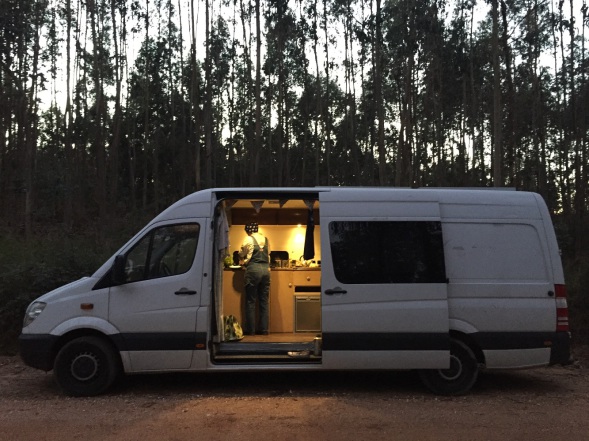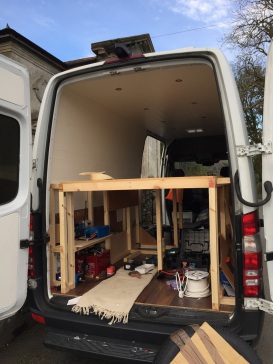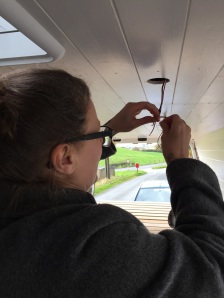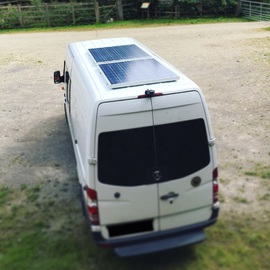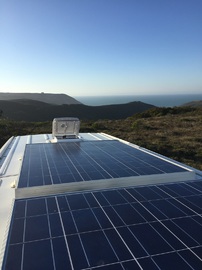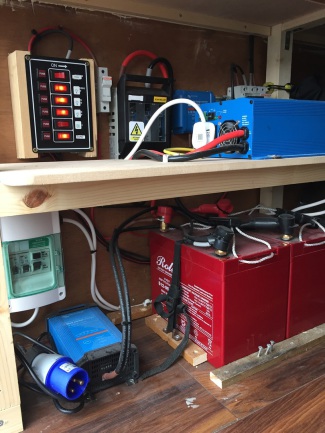Making a Van a Home - Off Grid Living
Last summer we were visited by Sophie Mckeand, an award winning Welsh poet, and former Young People’s Laureate Wales. Sophie and her partner - Andy Garside a graphic designer also from Wales - were about to embark on the adventure of a life time and needed our help!
They had decided they wanted to break free from the rat race and embrace a slower more minimalist way of living, firstly by getting rid of all of their unnecessary possessions then moving out of their 3 bed house and opting instead for life on the road and becoming full time van-lifers.
The first step to achieving their dream was to find the right size van to convert into a cosy new home for themselves and their two rescue dogs Kit and Bonnie purchasing a LWB hi-top sprinter van in April 2017. The van was just an empty shell so there was a lot of work to do if they were to be on the road by November - the deadline set by the need to vacate their property – Andy didn’t waste any time putting his graphic design skills to use designing a suitable layout for the van. The planning stage of any van conversion is vital to make the best use of limited space and optimise storage. Using the under bed area as a ‘garage space’ was a great idea, accessed via the rear doors it meant that anything muddy could be kept out of the living area. There’s also seating/work area next to the bed, where the seats create more storage, the bed also has a handy storage area at either side & then there’s the kitchen/cooking area in the main part of the van. When designing the layout of a live-in van the more storage space you can create the better. I particularly like Andy’s ‘couple’ layout meaning if you have a cupboard one side of the bed mirror this on the opposite side, as Andy and Sophie explained it means they both still have their own ‘space’ for their personal belongings which they thought was extra important when living together in a small space.
After the design of the van layout was complete the next step was to install a suitable electrical system that would supply all the power, lighting and refrigeration needed for a comfortable life on the road. The electrical system needed to be in place before any of the main units or insulation could be installed so they got in touch with us here at Remote Power UK to help them with the design, supply and safe installation of a suitable system.
We started by asking Sophie and Andy to make a list of everything they needed to power and for approximately how long each day. This information is critical to size both the battery bank and the inverter also the amount of PV although with a van you are very limited on the available roof space!
A fridge is likely to be the largest consumer in a typical van set up as they need to be on to keep your foods (and beer!) cool. We recommended they spend a bit more & go for a A+ energy rated compressor fridge as this would save them money in the long run by running more efficiently, saving the batteries from becoming too deeply discharged.. Also, a compressor fridge will run on average 12 out of 24 hours. A canny trick to reduce energy consumption further is to keep a 2ltr bottle of water (or similar) in the fridge to use as a cool mass a bit like an ice pack. You can then turn the fridge off when you go to bed and turn it back on when you get up and the sun is out (hopefully). I do this when camping and it works. Another bonus, if you are a light sleeper....you won't be woken by the noise of the compressor starting up.
While we are on the subject of refrigeration, I have been doing some tests recently using a 12VDC load sensing inverter and a 230VAC powered 70ltr fridge to see how the power consumption compares with a 12VDC fridge of a similar capacity. I found there was very little difference in consumption based on my measurements and the manufactures stated consumption figures of the 12 volt model. Worth considering as a decent 12 VDC compressor fridge will set you back £400-600, whereas a 230VAC fridge/inverter set up will cost around £200.
We suggested a system comprising of 2 x 180W Yingli Solar panels, a Victron MPPT charge controller connected to 2 x Rolls Solar AGM, 12V batteries supplying a Victron Phoenix 800VA, 12V inverter and a 12V fused distribution panel, we also fitted a split charge relay which enables the alternator to charge the batteries while the engine is running. As Sophie & Andy are planning on staying on campsites as & when they need to we added a Victron battery charger to the system as a means of mains charging.
All of the electrical items were wired through a RCD protected AC and DC fused distribution boards & the system is set so that the batteries charge while the vehicle is running. As a back-up for when conditions are bad & if staying put for a few days at a time where mains power is available, we also installed a mains hook up, this is connected to a Victron Blue Power 12/30-VBPC 12V battery charger and also supplies two radial AC circuits for direct mains power.
Sophie and Andy have been on the road for over 6 months now and are loving their new minimalist lifestyle, already travelling to Portugal, Ireland and all over the UK.
You can follow Sophie and Andy’s journey on Instagram - TheAbsurdTravels
or check out Sophie’s blog at - OUTSIDER
and follow Andy Garside on Instagram – @andyrgarside
IMPORTANT INFO! - A Note On Earthing And Bonding.
Earthing! A van sits on four rubber tyres! That's not the point!
As a final word if you are reading this with a DIY van conversion in mind I strongly advise you to seek a professional electrician to check over your wiring especially if you are installing a mains hook up or inverter.
Understanding earthing and bonding and how the correct installation of both operate your protective devises under fault conditions is vital as you can get electrocuted if installed incorrectly!


